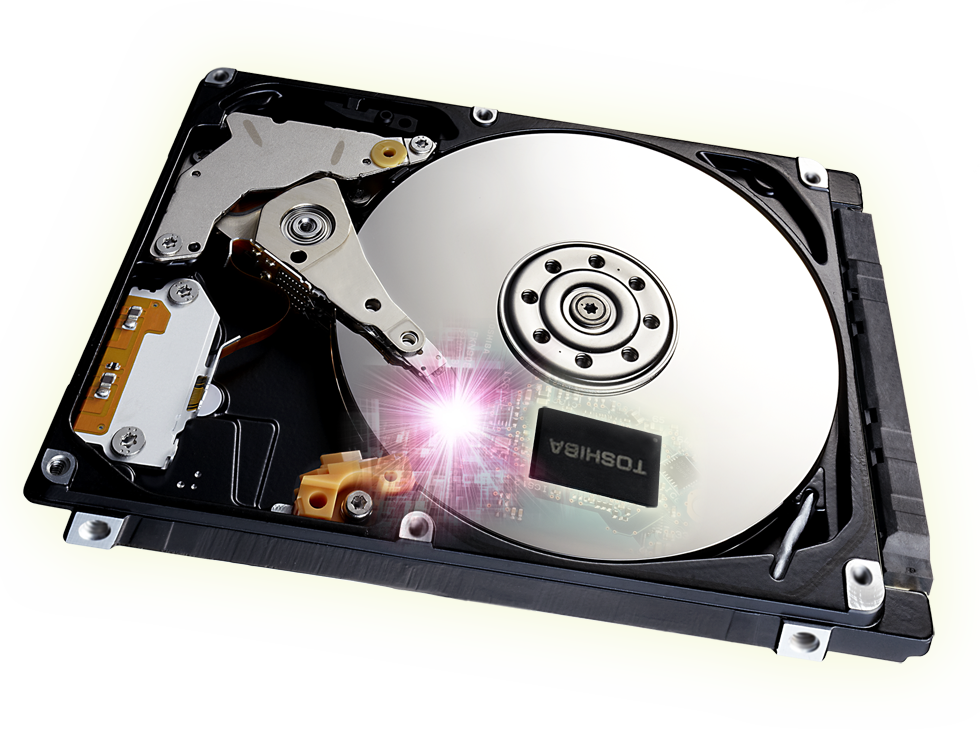Toshiba's First Hybrid Drives Are Now Shipping
Toshiba's first line of hybrid drives will first launch in notebooks later this year.
Toshiba said on Tuesday (pdf) that it has shipped its very first line of 2.5-inch hybrid drives, the MQ01ABDH series. These combine the best of both worlds: the speed and reliability of NAND flash and the cheap storage capacity of hard disks.
The new series currently features two drives: the 750 GB model (MQ1ABD075H) and the 1 TB model (MQ01ABD100H). Both drives consist of two platters and 8 GB of non-volatile 32-nm SLC NAND (for read and write caching), and measure just 9.5-mm high. Their overall size makes them ideal for ultra-thin notebooks, but will also work well in standard-sized notebooks, gaming PCs, all-in-one and slimline desktops and other digital computing applications.
Toshiba claims the drives feature "self-learning" caching algorithms that learn the system user’s data access patterns to optimize performance. "The self-learning caching algorithms also manage which user data is stored to the NAND Flash for quick response to the near future access from the host, as well as how the data in the NAND Flash is updated based on intelligent access pattern learning," the company said.
The specs, as seen below, show that the drives have an average seek time of 12 ms and a rotational speed of 5400 RPM. They also connect via a SATA 3 (6 Gb/s) interface.
"Hybrid Drives represent a significant innovative technology for Toshiba in combining the high-performance features of NAND Flash, with the key HDD attributes of large capacity and cost-effective data storage," said Joel Hagberg, vice president of marketing at Toshiba’s Storage Products Business Unit. "As the only storage company which designs and manufactures HDDs as well as NAND flash, Toshiba is in a unique position to capitalize on these benefits because the expertise on how these technologies function resides within Toshiba."
The MQ01ABDH series will be featured in various notebook PCs, with the first systems shipping in time for the holiday season – a retail version may be launched early next year. Meanwhile, here's the actual spec list:
* Maximum Capacities: 750 GB (MQ1ABD075H) and 1 TB (MQ01ABD100H)
* Number of Platters: 2
* Areal Density (Max): 858.1 Mb/mm2 (553.6 Gb/in2) and 1153.4 Mb/mm2 (744.1 Gb/in2)
* Average Seek Time: q12 ms
* Rotational Speed: 5400 RPM
* Buffer memory: 32 MiB
* NAND Flash Size: 8 GB
* Interface: Serial ATA 3.0 (ATA-8)
* Interface transfer rate: 6 Gb/s
* External dimensions (WxDxH; mm) 69.85 x 100.0 x 9.5-mm
* Weight (g) 117 g (max)
* Shock resistance:
-- Operating: 3,920m/s2 (400G) 2ms
-- Non-operating: 8,820m/s2 (900G) 1ms
* Acoustics:
-- Idle (average): 23 dB
-- Seek (average): 24 dB
Get Tom's Hardware's best news and in-depth reviews, straight to your inbox.

Kevin Parrish has over a decade of experience as a writer, editor, and product tester. His work focused on computer hardware, networking equipment, smartphones, tablets, gaming consoles, and other internet-connected devices. His work has appeared in Tom's Hardware, Tom's Guide, Maximum PC, Digital Trends, Android Authority, How-To Geek, Lifewire, and others.
-
joytech22 I wouldn't mind a 1TB version for my laptop. Oh boy my whole Steam library would fit I think.Reply -
Shin-san I've been disappointed with the 4k performance of hybrid drives, where the SSD is needed the most for them. I get 50 MB/sec off magnetic drives on large files.Reply -
jerm1027 Shin-sanI've been disappointed with the 4k performance of hybrid drives, where the SSD is needed the most for them. I get 50 MB/sec off magnetic drives on large files.You need repetition for the data to be cached in the NAND flash. Then the performance will be boosted. If it's brand new data, it's being accessed solely from the mechanical portion of the drive.Reply -
jerm1027 ReplyWhy 5400RPM?
Lower power consumption and less heat. If the most used data is stored in the SSD cache, why would you need a fast mechanical drive? -
mocchan Interested in seeing performance reviews of this drive seeing as to how I have a Momentus XT. This may just be my next drive for my laptop...that 1TB of storage is hard to resist lol!Reply -
techcurious Both Seagate and Toshiba offer only 8GB of NAND in their hybrid drives. So I assume that they have probably tested prototypes with 16GB of NAND and found that it didn't improve performance by much. But still, it's hard for me to ignore that 16GB would allow for more data to be retained in the NAND cache and therefore 16GB would instill more confidence in achieving a more consistent speed boost from the NAND cache, even with programs and files used less often (especially with a 1TB or larger drive). I am waiting for 16GB models to come out before I use hybrid drives and recommend them to others.Reply
Adding just 8GB more NAND shouldn't increase the overall cost of the drive by too much, as most of the cost comes from the controllers (SSD Caching, etc) and HDD anyway, which remain the same no matter how much NAND is included.
